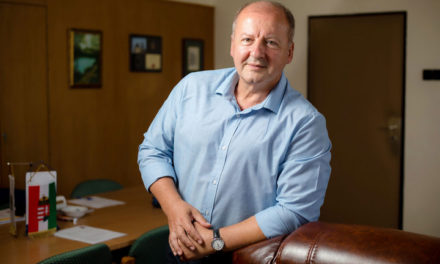Not only did they adopt the Equilibrium Institute's proposal package one by one - of course without citing the source - but they didn't even change the order of the individual points. Written by Francesca Rivafinoli.
I imagined that if five out of seven practicing politicians of a party have personal experience in living abroad and moving home, or not moving home, then developing a program targeting Hungarians living abroad would be a real joke for them. Own experiences, first-hand impressions, crowds of affected acquaintances - only independent thoughts and original suggestions can emerge from this. It was me.
I eat my unshakable naivety.
Indeed, if we read the TISZA Party's "complex homecoming program" and add to it the Equilibrium Institute's "How to lure Hungarians who have migrated abroad?" package of proposals from the beginning of the year, we can state: not only did they adopt the whole thing one by one without citing the source, but they did not even change the order of the individual points.
The title of the "Homecoming" program of the Fidesz government was sketchily written down and written over as a catchy name, says Goodbye.
It is not as if the use of the ideas of a think tank is a drama, but at the same time, one would expect some kind of indication of this from a brilliant (because he only accumulates positions in his own right) lawyer, a moral champion with the epithet "The Man". Annalena Baerbock can also plagiarize.

Source: Péter Magyar/Facebook
People get disheartened if only because they fail to come up with their own added value on such a relevant topic, then what can we guess, how slavishly the politicians of the party would copy on issues that are foreign to them? Here is the very first mentioned program item, which is obviously considered the most important: "financial assistance", that is, for moving home from Western Europe. Péter Magyar Official The Man, who returned from his job abroad to the positions of director and CEO, as well as Dóra Dávid (annual salary in England converted to HUF 90 million), Eszter Lakos (previous income in Brussels 2.9 million per month, salary at home after moving home 1.2 million), A couple marked by the names of Gabriella Gerzsenyi (who left her €3.8 million job in Brussels in 2021 to become a freelancer here) and Kinga Kollár (immediately a senior employee of the Economic Competition Office after moving back home) with the help of an additional copy+paste
the idea that Hungarians living in Vienna or London should be helped from Nógrád and Zemplén tax forints could really have been ranked three or four paragraphs lower,
to fill the poor man's moving box - but who has time for such fine-tuning when you also have to choose trousers for the evening's VIP reception.
While otherwise, the Equilibrium Institute would limit financial support to skilled workers (including IT professionals) working in professions with a shortage, who "couldn't find their financial means abroad" ; and the money would be provided through the company that employs them at home, rather than directly into their hands.
According to their questionnaire survey, a one-time subsidy of four million forints would encourage many people to consider returning home - a suggestion that could be taken for granted in itself.
however, the TISZA Party would rather put a shovel on it, without mentioning a set of conditions.
The "complex program" also states, for example, that once they are in government, they would inform people living abroad about the benefits of moving home (focusing on mental balance), and that they would also provide people preparing to return home with a lot of other information, in addition to supporting Hungarian-language education abroad, which of course largely already given, in the framework of various state programs and tenders (500 million forints are currently being allocated by the Potápi Árpáds for the operation, development and events of Hungarian organizations operating in the diaspora and Hungarian weekend schools; starting with the Hungarian scout team in Lichtenegg, the Austrian Hungarian Pedagogical Association and the through the Hungarian School and Playhouse in Guildford to the Hungarian Association in Jönköping, money is given to those who ask);
but how much sexier if TISZA PROMISES the same with a never-before-published photo in gray pants!
This lack of ideas is somehow terrifying – I am writing this as a person who has moved home, as many acquaintances who have moved home and who have not.
First of all: it doesn't work in such a way that if I get into government, x years from now, I would very enthusiastically talk to people living abroad about the "spiritual benefits" of moving home and about the decent salary available at home,
until then, however, I recite daily that Hungary is the most corrupt and poorest country in Europe, with a disastrous education and health system (where, moreover, one is forced to look for a job at Lőrinc Mészáros, because there is simply no other option).
Anyone who has ever seen a foreign Hungarian getting information from 444 knows that the continuous bombardment with similar messages can increase the aversion to returning home to the point of illness. The omniscient narrative eats itself massively into their brains, practically ineradicably. It can also be clearly read in the study of the Equilibrium Institute: among the factors that "greatly prevent" the return home is the negative perception of the situation in Hungary, as well as the "generally experienced" pessimism and lethargy of the Hungarian people.
For this reason, the more serious cases already took out gigaloans with a term of 20-30 years years ago in order to buy an apartment locally, in the west - the zeroth element of an understandable, innovative program to attract home would therefore be to stop the constant wailing, before more of our hysterical compatriots bury themselves in concrete abroad, until retirement with lasting financial commitments. The spreading of all kinds of slogans should not be planned for the distant future,
but we should have started communicating the encouraging story of the Tisza politicians who successfully moved home already yesterday.
This would be the first point after zero: instead of encouraging the party to focus on money and the fear of a decrease in the quality of life, which is very common among people living abroad, by waving "financial aid", the misconception that the lower amount of income is associated with an automatic decrease in well-being and standard of living. Moreover, after a certain number of years, an employee with a sufficiently good job and managing his money gets to the point where his needs and even his desires, which can be satisfied with a Mastercard, have been met, but he is also doing well with retirement savings -
at this point at the latest, a sane person puts wealth accumulation at the back of their priority list.
One of the MEPs from the TISZA party came home and jumped headlong into farming precisely because he was tired of "the welfare (consumer) perception of the welfare (consumer) society" - how many people feel the same way, but from the insidious comfort and security of their indefinite-term contract abroad they simply do not dare to make such a change (even at the cost of burnout). In addition, András Kulja is there: his wealth declaration could be waved to the effect that, hey, Hungarian doctors working in Switzerland can earn that much at home, with significantly lower living costs. If you were to take your savings home with you, #don't be afraid, you can easily find an idyllic place to live in Hungary; moreover, by teaming up with a few like-minded colleagues, you can even create the right microclimate for yourself at your workplace. You just have to be as flexible and open at home as you are abroad.
And finally, with the topic of savings, we come to another painful shortcoming of the "homecoming program". It is possible that the stories of successful and satisfied people moving home usually start with "when I moved out/we moved out, the beginning was still a drag due to deposits and other initial costs, but from the second to third month I set a four-digit amount, which automatically went to a savings account ".
It is personal experience that it is easy to live in complete prosperity abroad even if one does not waste money unnecessarily, just because one has it;
however, not a few slip into spending without reason and sense, from which it is really difficult (in the absence of substantial savings) to switch to a possibly lower income in Hungary. Therefore, it would be an innovative proposal, for example, if the state encouraged people living abroad with some kind of housing savings scheme from the beginning to be financially aware, to be disciplined, and as a result of all this, within a given time, to invest in real estate in Hungary, which is still much better than what is available abroad (or the old to solve the problem of their old foreign currency loan). Or, of course, there could easily be thousands of smarter and more efficient saving solutions, only then should you come up with them.
Even if the party doesn't want to convince us that the only independent thought on the subject is the model photo of Péter Magyar in gray pants chosen as an illustration.
Featured image: Péter Magyar/Facebook













